#sublet 2020
Explore tagged Tumblr posts
Text
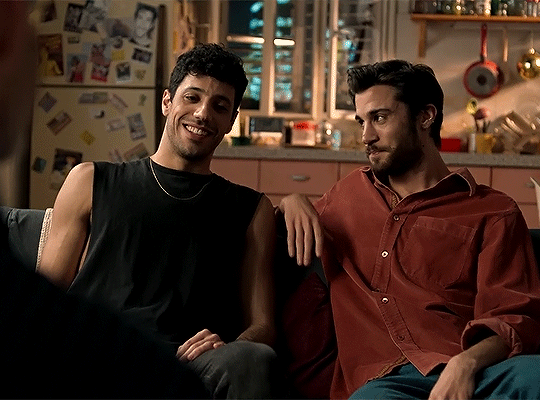
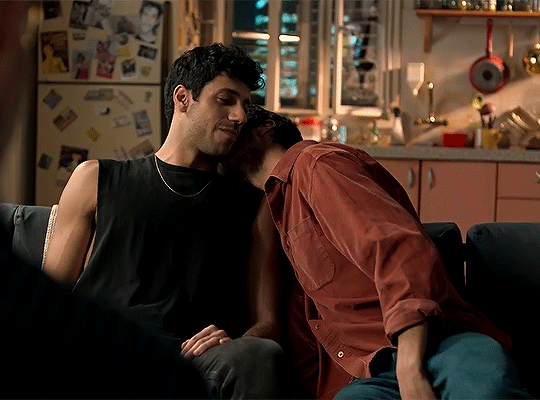
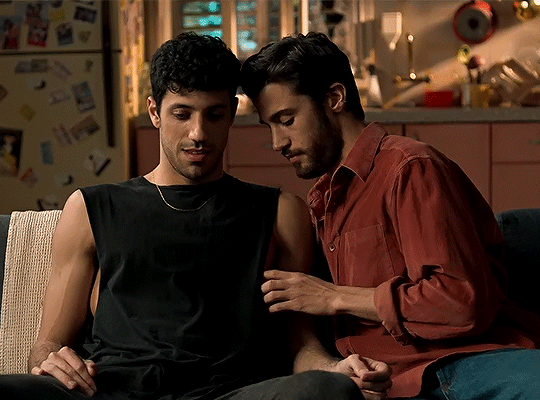
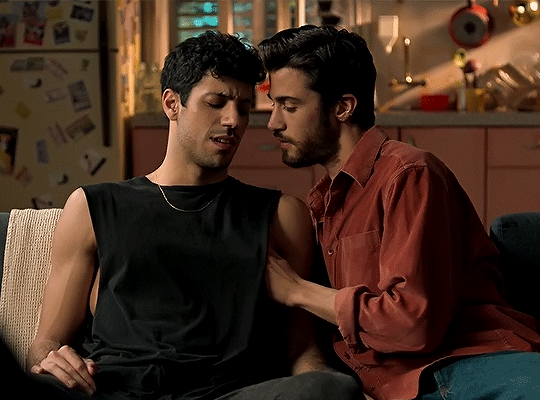
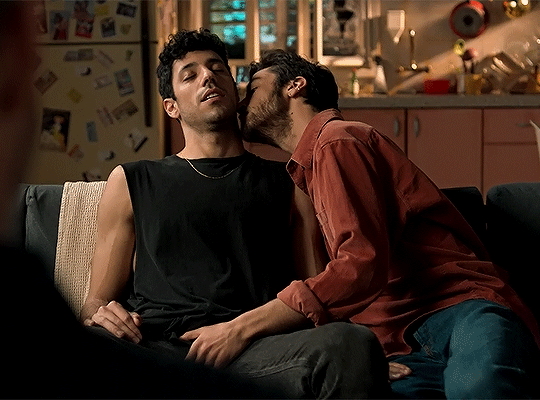
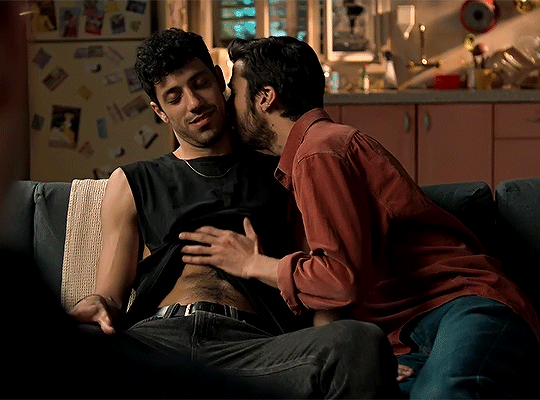
NIV NISSIM and TAMIR GINSBURG Sublet (2020) dir Eytan Fox
#niv nissim#tamir ginsburg#sublet#sublet movie#sublet 2020#movie#film#filmedit#lgbtedit#gayedit#gay#lgbt#men#menedit#usermichi#userwilliam#gifs#mine#*
5K notes
·
View notes
Photo
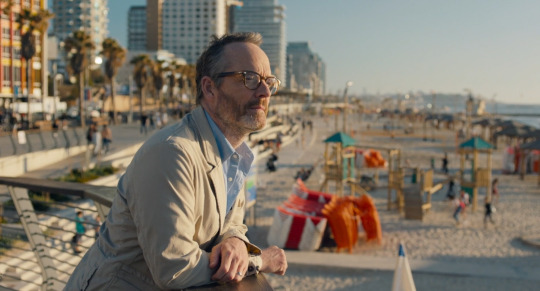
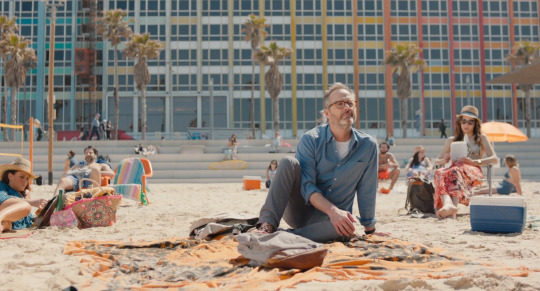
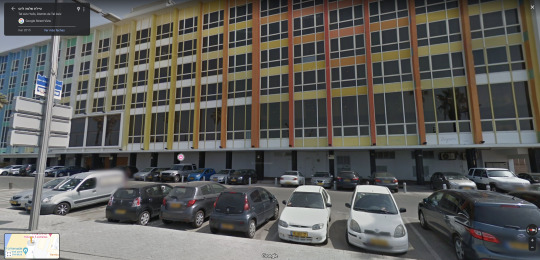
Sublet Eytan Fox. 2020
Seaside הירקון 87, Retsif Herbert Samuel St 94, Tel Aviv-Yafo, Israel See in map
See in imdb
#eytan fox#sublet#john benjamin hickey#beach#seaside#tel aviv#israel#movie#cinema#film#location#google maps#street view#2020
6 notes
·
View notes
Text

for @spnficrecfest day six: case fics 🧡
Ions in the Ether by @nigeltde-fic 10.9k words, rated E, published 2019 When was the last time you trusted happy.
Gospel Truth by Cerberuss 15.2k words, rated E, published 2020 ‘DOES YOUR BROTHER KNOW THAT YOU WANT HIM?’ Individually placed letters, bold and tinged brown with the weather. Sam can’t look away and he prays, dream dream dream. This sort of introspection could have come from no one but himself. His secret, his affliction, on display as a reminder. He put this here. Don’t forget, Sam, you’re abhorrent. This is all you.
the constant vow by deadlybride / @zmediaoutlet 119.5k words, rated E, published 2022 With Crowley apparently dead and Sam's soul back in place, even though Eve is a worry and Castiel's fighting a heavenly war, Sam and Dean at last have some space to get back to what passes (for them) as a normal life. They've just finished up a pretty standard job and are killing time in snowy Wisconsin when Dean wakes up no longer looking like Dean. That's just the start of their problems.
Almost At Home by balefully 24.3k words, rated E, published 2008 Sam graduates from high school in early June in rural Tennessee. He and Dean start the summer with an all-nighter of celebration; the day after, while both fight hangovers, John calls to assign them their first hunt by themselves.
Suave & Complicated by OldToadWoman 56.9k words, rated E, published 2015 Sam and Dean discover a useful, little, magical artifact. No one is forcing them to do anything. No one is going to die if they don't. They don't even feel a strange compulsion. But… it would be really helpful if they powered up the magical stone… and… all they have to do is kiss.
Crossed Wires by @rivkat 10.9k words, rated E, published 2015, check warnings Dean thinks Sam is dead.
Yesterday, minnesota by @goshen-applecrumbledore 29.7k words, rated E, published 2022 Any initial awkwardness filtered away over a hundred miles of highway as Sam thumbed through the missing witch’s diary again. Some people had secret coke habits or secret second wives, and some people had passionate, pitch black, no-kissing sex with a family member every four to six months and never talked about it. You had to find ways to cope.
Sight Lines by kickflaw/kissyn 21.3k words, rated E, published 2012 Dad's on a hunt, Dean's acting strange, and Bilton, NY, is the last place on earth Sam imagined he would figure out how to make everything fit right.
They Then Ate the Sailors by coyotesuspect 24.3k words, rated M, published 2013 The summer before Sam leaves for Stanford, Sam and Dean sublet a student apartment in a heat-wave gripped Chicago. With John tied up with a case in Iowa City, Sam and Dean are left to figure what's behind a recent spate of drownings. Sam wrestles with the weight of the secret he's keeping from Dean, while Dean struggles with his feelings for Sam. Things come to a head when a young girl goes missing and Sam nearly drowns.
a thousand dreams within me softly burn by dooping_star 14.6k words, rated T, published 2020 "there is something fierce and terrible in me eligible to burst forth, i dare not tell it in words," - walt whitman, ‘earth, my likeness’, leaves of grass
145 notes
·
View notes
Text
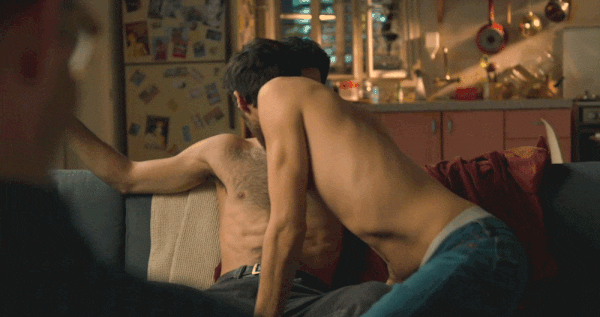
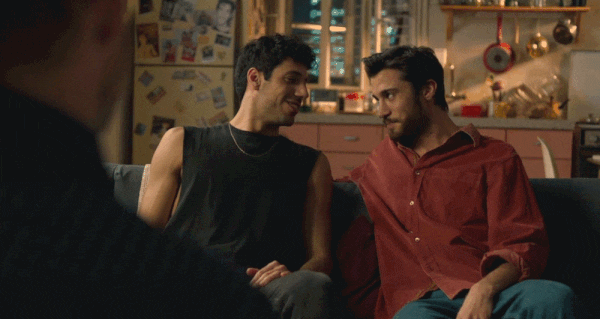

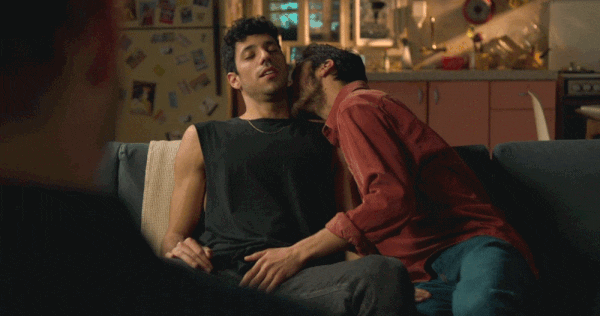
Niv Nissim, Tamir Ginzburg : Sublet (2020)
#niv nissim#tamir ginzburg#sublet#gay#hairy chest#hairy pecs#hairy abs#chest hair#nivnissim#tamir ginsburg#tamirginzburg#tamirginsburg#john benjamin hickey#johnbenjaminhickey#israeli#israeli hunks#israeli actors#israeli movie#lgbt#lgbtq#lgbtqi
131 notes
·
View notes
Note
imma pose you a question! what is your most out there ghostface headcanon? the one that has you like this
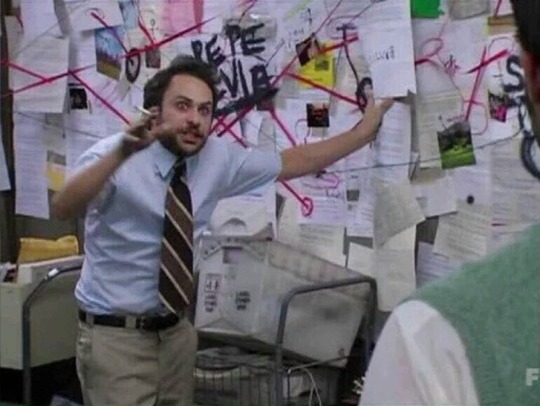
trying to explain your thinking and reasoning if there even is any
Hi! Thank you for the ask! If you had asked me this back in 2019 I probably would have answered with either my headcanon (now canon) of his dad being a military man or the other headcanon where he’s an ex-Mormon/uses being Mormon as a cover.
I’ll talk about the Mormon one, since while it’s not exactly “out there” the way believing in Bigfoot is, it’s not a headcanon I see come up often (like at most its jokes about him being from Utah).
In 2019 and 2020 I fell down a rabbit hole of Mormon true crime thanks to Netflix. The documentary about the Salt Lake City bomber was a particular inspiration due to the focus on document forgery. It made me consider whether Danny might have some loose links to the ‘subculture’ if you will, as either personal knowledge or connections would help him when it comes to forging a fake identity.
As it stands I don’t think Jed Olsen is the only identity he’s used, I think he’s used others. I also don’t think he just uses completely falsified documents, but probably steals actual identities sometimes.
Back to the Mormons. There’s a big survivalist culture, like, if you actually check the LDS church website you can find resources on making survival kits/bug-out bags. There’s a lot of fascinating quirks in the culture of the church like this. I felt like the survivalist aspect would build nicely into the fact he’s a drifter. He knows how to pack and he’s ready to go at a moment’s notice, if he needs to ditch his car he can easily do so and make an escape on foot.
I’ve generally tweaked this headcanon over time to where Danny himself isn’t a church member, so he’s no longer ex-Mormon in my headcanon, but I feel like it makes a lot of sense that he would still have picked up elements and some of the quirks. I like the idea that some of his family are Mormon, and through this he learned that a lot of people won’t question those who act “godly” and “righteous” especially if they’re religious themselves. A funny quirk he’s retained is that he doesn’t drink coffee, instead his apartment and desk at work are littered with cans of cola.
Another quick headcanon that is funny is I like the idea that he carries a VHS player with him. It’s one of the first purchases he got as a young man and he paid a good amount of money to get it so it moves with him. He tends to sublet properties that already come with furniture, which suits him just fine, but not everybody owns a VHS player. If a current property already has one, you’d likely see two VHS players, which would be pretty weird to see if he had somebody over. Good thing he doesn’t usually lol
#danny jed olsen johnson#headcanons#I could write a lot more about his politics and worldview haha#ghostface#dbd ghostface
8 notes
·
View notes
Photo




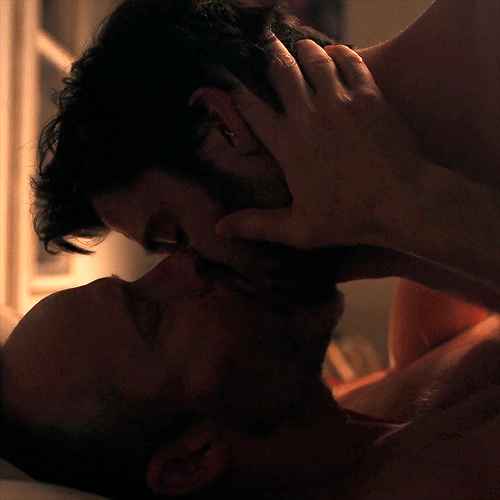
John Benjamin Hickey and Niv Nissim in Sublet (2020)
60 notes
·
View notes
Text
By: Adam Zivo
Published: Jun 6, 2024
At a trendy cafe in the bohemian Florentin district of Tel Aviv, Niv Nissim, a 30-year-old gay Israeli, described the Oct. 7 attack by Hamas as “maybe the worst moment for everyone who lives in Israel.��� He spoke of an acquaintance who perished at the Nova Festival massacre. “He went to dance and he was murdered. Most of the people that got murdered and kidnapped are people with the same values that I have — peace advocates,” Nissim said.
He was shocked to see international queer activists glorify Hamas in the immediate aftermath of the Oct. 7 massacre. “They don’t know what Hamas is. They think Hamas is like a group of superheroes — and that’s the thing. It’s a terror organization. Same as al-Qaida,” Nissim said. “For gay people around the world to be pro-Hamas right now is crazy. And it’s wrong.”
After Hamas massacred more than 1,100 Israeli civilians, LGBTQ activists across the western world mobilized. On city streets and university campuses, they called for the destruction of Israel and carried “Queers for Palestine” banners alongside rainbow Palestinian flags. Claiming that queer and Palestinian advocacy are inextricably linked, they minimized the brutality of Hamas, who they portrayed as freedom fighters.
What are we going to do now? What can we do? How could we fight for human rights (in Gaza) after what happened?
-- Niv Nissim, talking about October 7
Their behaviour ignited a global debate about western queer activism. Commentators noted that not only does Hamas murder gay people, Israel is the only country in the Middle East that supports queer rights. Was it not delusional for activists to side with Hamas?
And what exactly did people mean when they shouted, “Queers for Palestine”? For some, the slogan represented a principled commitment to the human rights of the Palestinian people, without supporting Hamas. But for others, it meant the dismantling of the Israeli state, which implies the ethnic cleansing of millions of Jews, and the glorification Hamas’s war crimes.
Throughout this debate, the everyday lives of LGBTQ Israelis and Palestinians — their fears, trauma and triumphs — were largely ignored. In May, I visited Tel Aviv through a trip spon.sored by the non-profit Exigent Foundation, a Jewish group that focuses on public education. Arriving a few days early, I independently spoke with queer people in the city to find out what their lives were really like, what they thought of the war and how they felt about western activists’ views on the conflict.
I interviewed four gay Israeli men, each with distinct experiences and perspectives. They were by no means a comprehensive cross-section of Israel’s LGBTQ community, but they opened a window into their world. Amid tight timelines, I was unable to secure interviews with gay Palestinians, who can be notoriously difficult to track down because they fear revealing themselves, so as an imperfect substitute, I asked my Israeli interviewees to share their insights on them.
These are their stories.
Actors and meteors
Niv Nissim is an actor who gained moderate fame after starring in “Sublet,” a 2020 Israeli film about a gay travel writer who rents an apartment from a film student. Unsparing in its depiction of gay hookup culture, the widely acclaimed film could not possibly have been made anywhere else in the Middle East.
Nissim said he has not personally experienced homophobia in Israel. “I’m not scared of walking hand-in-hand with my partner,” he said, before clarifying this was likely because he lives in Tel Aviv, which exists within its own cosmopolitan bubble. Homosexuals from across the country, indeed the entire world, flock to the city, with official statistics suggesting that roughly a quarter of the local population identifies as LGBTQ.
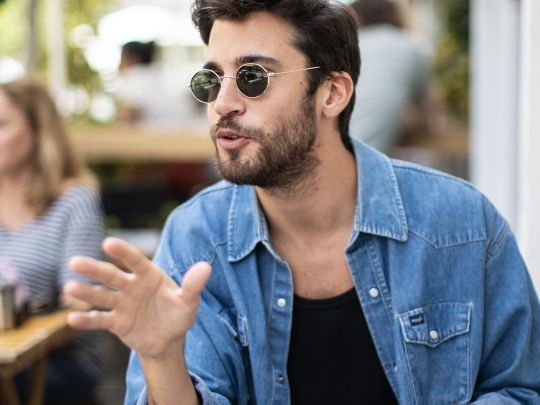
[ Niv Nissim, a 30-year-old actor and a gay Persian-Israeli living in Tel Aviv in May 2024. He says he empathizes with Palestinians notes they are a “big part” of the city’s underground queer scene. ]
Gay life is different in Israel’s smaller towns, as well as in Jerusalem, which is known for being religious and conservative. In those places, being openly gay could sometimes be “frightening,” he said, because of the possibility that religious Arabs or Orthodox Jews might beat you. Still, he said he felt extremely lucky to be Israeli considering the lethal homophobia elsewhere in the Middle East. His own family had fled from Iran, where being gay is legally punishable by death.
Palestinians are “a big part” of Tel Aviv’s gay community, Nissim said. One of his close friends is a Palestinian fashion designer who organizes parties in the city’s underground voguing scene (voguing is a flamboyant style of dance closely associated with queer culture). “It’s not even a weird thing. We don’t look at them as different or something,” he said.
Many gay Palestinian men, facing violence back home, escape into Israel to live in relative safety. Organizations across the country help them find shelter and get back on their feet (the same services are also provided to queer people fleeing Orthodox Jewish families). “If you are a gay person who needs help, no matter where you come from, you’ll get help,” said Nissim.
He said he was unaware of any serious anti-Palestinian racism in Tel Aviv’s queer scene. “(It is) really weird if someone will be racist here in the gay community.” Nissim is a Persian-Israeli, and while the relationship between the Ashkenazis (European-descent Jews) and Mizrahis (Middle Eastern-descent Jews) may have been fraught decades ago, everyone is now quite “blended.”
For gay people around the world to be pro-Hamas right now is crazy. And it’s wrong.
-- Niv Nissim, 30, Actor
Like many artists, Nissim and his friends are politically progressive and empathize with the Palestinians. “It’s not a real life. They don’t have real rights. They can’t go anywhere. Kind of open-air prisoners,” he said. For much of his life, he advocated for Palestinian self-determination within the framework of a two-state solution. “We wanted to say, enough with the oppression. Enough with the war — both sides — let’s not advocate war. Let’s advocate peace.”
Under the leadership of Israeli Prime Minister Benjamin Netanyahu, Nissim said artistic productions that criticized the government or featured positive Israeli-Arab relationships — “impossible love stories,” he described them — faced increasing censorship. Over time, he and other Israelis came to see Netanyahu and his allies as corrupt and autocratic. “It was starting to look like a very Third World country.”
In a bid to stay in power, Netanyahu formed a coalition government with several ultranationalist and ultra-Orthodox parties in November 2022. Two months later, the new government announced its intention to impose controversial reforms that would curtail the independence and influence of the country’s judiciary.
While Israelis rebelled against Netanyahu’s reforms in nationwide protests, many within the LGBTQ community worried their rights would be rolled back. Nissim said it is rare to find gay supporters of the present government; it’s like “shooting yourself in the leg,” he said.
Neither same-sex nor interfaith couples can marry within Israel, as only religious marriages can be conducted in the country. However, Israel fully recognizes international civil marriages, including same-sex marriages, so queer Israelis simply tie the knot abroad. Some of these marriages occur over Zoom, through a legal loophole that allows officiants in Utah to provide virtual ceremonies to couples anywhere in the world — these marriages are quick, cheap and valid under U.S. law. Fearing Netanyahu’s coalition partners might restrict same-sex marriage rights, Nissim and his boyfriend decided to get a “Utah marriage” last year, just in case.
Then Oct. 7 happened, and the political tumult of the preceding months was, briefly, vaporized. In recent weeks, large protests against Netanyahu’s coalition government have resumed, especially in Tel Aviv.
Like the rest of Israeli society, a chasm now exists within Tel Aviv’s gay community — one side calls for a ceasefire and the other supports Netanyahu’s plans to fully eradicate Hamas, whatever the cost. Nissim supports the first camp, though he could see both sides.
His heart was filled with uncertainty. He said he used to chant, “Free Palestine,” but now felt he no longer had the right to do so while there were still hostages in Gaza. “What are we going to do now? What can we do? How could we fight for human rights after what happened? How can we do it?” he asked.
He understood the hate by both Palestinians and Israelis. “What happened was the worst thing — for me, for them, for everyone. Killing and raping and burning and taking people. And not only people, like good people, who fight for peace. It’s the worst thing … When gay people wanted our rights to be given to us, we didn’t burn buildings or kidnap people. We didn’t kill people. We shouted and we went to the streets. We protested for our rights and for peace,” he said.
Nissim has learned to adapt to the heightened tensions of war. When Iran launched hundreds of drones and missiles at Israel in April, he and his boyfriend simply sat outside and watched the Iron Dome shoot them down. They looked like meteors or shooting stars. “It’s surreal, but this is our life here. You have to develop some kind of rough skin. And just somehow be cool.”
A soldier finds his home
Michael Tubur, a 31-year-old gay soldier with the Israel Defense Forces (IDF), sits at a sunlit park, recounting his experiences evacuating wounded soldiers from Gaza last October and November. “It’s very difficult to do surgery on the field. Our job was just to give them the first aid, just to stop the bleeding and stuff, and take them outside very fast,” he said, smiling often.
It took two weeks for Tubur’s unit to enter the Gaza Strip, as the IDF had to ensure that the surrounding Israeli land had been cleared of Hamas fighters. By that point, Gaza had been heavily bombed. The destruction was unlike anything he had ever seen before.
One of the first things the IDF did was take everyone’s phones away. Hamas had used fake social media accounts featuring stolen photos of beautiful women, to install spyware on Israeli soldiers’ devices, allowing them to eavesdrop and track their locations. For three weeks, Tubur was completely cut off from the world. The situation was tense and uncertain, and he felt afraid.
“At the beginning, we thought that we are going to see an actual army. And we discovered it’s not going to be like that. They went into the tunnels. You don’t know where they’re going to come out from,” he said.
Hamas fighters would ambush soldiers with rocket launchers or guns and then melt away. After these attacks, it was imperative for the Israelis to confirm whether they were being lured into a trap. On several occasions, Hamas purposely used smaller assaults to attract medics and then followed up with larger, lethal bombardments. Tubur’s unit would wait on standby, keys in the ignition, ready to race in once they knew the situation was reasonably safe.
Suddenly you saw gay warriors and commanders, like major commanders, people who were in the intelligence, in the Air Force, in everything. Then you saw gay guys who were killed.
-- Michael Tubur, 31, Soldier
“You just act. You don’t have time to think. Someone else’s life is on the line,” he said. “There were days that nothing happened — and you’re just sitting and doing nothing. And days when everything went from zero to 100, and I was just dying to go back inside the sleeping bag and close my eyes.”
He maintained the IDF did its best to minimize civilian casualties amid a “very, very complicated situation.”
At the beginning of the war, Israeli soldiers would automatically attack unknown individuals within a 400-metre radius around them, he said, but the response to anyone further away was scrutinized and debated. To protect civilians, that radius was later reduced to 50 metres. That meant Hamas fighters could freely roam nearby so long as they were unarmed and pretended to be non-combatants. These fighters would then access weapons caches hidden throughout Gaza, launch lone-wolf ambushes, and then abandon their weapons and pretend once again to be regular Palestinians.
“So, then the mission became much harder. And the progress was very, very slow — because now you need to move house by house, building by building, and make sure there is no weapons there,” said Tubur. Sometimes the IDF would miss caches or tunnels, which allowed Hamas to attack from behind.
While critics, including the International Court of Justice, claimed that Israel is committing “genocide,” Tubur found this accusation perplexing. If that was true, he said, the IDF could have simply been ordered to “just bomb everything,” rather than commit to a complicated ground operation at the cost of Israeli lives.
“I’m very sad that people got killed — children and mothers. But it’s a war and war is complicated. Everyone wants to do the best and try to make as less casualties as they can.”
Tubur, who has Arab friends, believed that Israelis and Palestinians could peacefully coexist. But this would require Palestinian imams to embrace more moderate interpretations of Islam, he said.
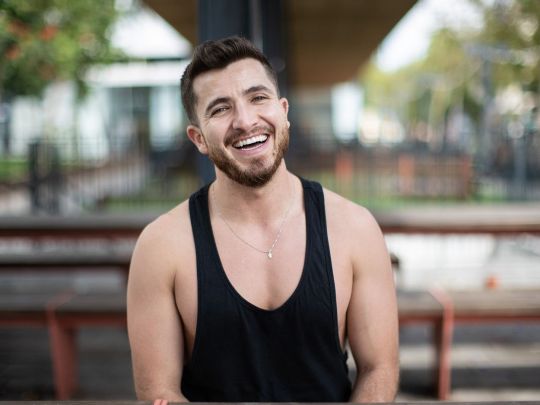
[ Michael Tubur, a 31-year-old gay soldier with the Israel Defense Forces (IDF), shown in Tel Aviv in May 2024. He hopes the Israel-Hamas war at least helps conservative families broaden their perceptions of the LGBTQ community and be more accepting of their gay sons. ]
In some ways, he was grateful for the war and how it helped show traditional Israelis that gay men deserve equal rights as they are “equal in death.” Many traditionalists believed that queer people simply party in Tel Aviv, parade naked on the streets and disregard everyone else’s troubles, Tubur said. “Then suddenly you saw gay warriors and commanders, like major commanders, people who were in the intelligence, in the Air Force, in everything. Then you saw gay guys who were killed.”
Shattering stereotypes is important for Tubur. He came from a religious family that had never seen a gay person until he came out of the closet. They thought all LGBTQ people were drag queens or transgender, which made it hard for him to accept himself. He struggled to reconcile his homosexuality with his masculine persona and some of the traditional values he cherished, such as starting a family.
When he finally came out at age 26, his parents assumed he was a “special gay,” because he didn’t fit the stereotype. Over time, they met his gay friends, including some in the military, and realized they were just people.
Tubur hoped the war would help other conservative families broaden their perceptions of what it meant to be LGBTQ, and make it easier for them to accept their gay sons. “There was a story about someone (who) was in the closet and got killed. And his boyfriend posted a letter where he said, ‘I cannot tell you your name. But I miss you so much. And I cannot share it with anyone because you’re in the closet.’ When I read it, I was crying, because how can someone bear this kind of pain by himself?”
Military service is mandatory for almost all Israelis, which makes the IDF a microcosm of wider society: progressives and conservatives serve side by side. During the quieter days in Gaza, Tubur and his comrades spent hours talking and learning about their lives. “You are a unit, and you need to sit next to each other, be with each other. You don’t have any other option,” he said.
He recalled a fellow soldier, an Orthodox Jew, who told him that being gay was unnatural. Rather than take offence, Tubur talked things out with him. They did not agree on many issues, Tubur said, but they developed an understanding.
“He still doesn’t accept the way I live, but now he knows how it is. He knows what it means. He knows how it feels. I think that, in the long term, this thing’s done very good. Because when the war will be over, people will go to their houses, people will go to other places, but they are a different person — you understand?
“This time, he won’t be so against the gays. He will think a little bit before he will shout,” Tubur said.
The filmmaker and gay Palestinians
Yariv Mozer, a documentary filmmaker in his 40s, met me at the Haaliya Community Country, a new recreational building that acts as a de facto hub for Tel Aviv’s LGBTQ community. Rainbow flags hung above the pool and the gym was packed with gay men. As we entered, a trans woman who helped manage the place welcomed us warmly.
Ten years ago, Mozer directed a documentary, “The Invisible Men,” which followed the lives of three gay Palestinians who had fled to Israel and then found asylum in the west. Through this film and other projects, he is keenly aware of the challenges gay Palestinian men face.

[ Yariv Mozer, a documentary filmmaker in his 40s, at the Haaliya Community Country in Tel Aviv, in May 2024. He is in favour of a two-state solution that has nothing to do with Hamas. “Hamas is a brutal, extreme, fundamentalist religious group, which believes in the power of violence to achieve their goals.” ]
Not only is Palestinian culture deeply religious and conservative, Mozer explained, but communities are also organized into sprawling tribes where a family’s reputation is paramount. “You can be gay, so long as no one knows about it. But if someone will catch you or see you, or you will be exposed as being gay, this can harm the honour of the family. So you hear a lot about honour killings and punishments.”
These murders are tolerated by local authorities and occur in parallel to state-backed violence against sexual minorities. One of the characters in Mozer’s film was tied up by his father after his family learned of his homosexuality. The man escaped with his life, but not before his father sliced his face with a knife, leaving him with a permanent scar.
Mozer said both Israeli and Palestinian security forces prey upon the vulnerability of gay Palestinians and blackmail them into acting as intelligence assets. “A lot of men are very much afraid of being openly gay or being suspected as gays, because they will know that they can be exploited by both sides.” Mozer recalled the story of one of his interviewees who the Palestinian Authority had suspected was a gay collaborator. They interrogated him for hours, beat him and held his head in a toilet.
Caught between violent relatives and predatory security forces, many gay Palestinians from the West Bank flee to Israel for safety (those in Gaza, where the borders are sealed, escape to Egypt). But even in Israeli cities, they cannot breathe easily. In 2022, a 22-year-old gay Palestinian man, Ahmad Abu Marhia, was kidnapped into the West Bank and beheaded — he was waiting to emigrate to Canada at the time of his murder.
The Israeli government has historically refused to grant asylum to queer Palestinians, out of fear that could lead to a flood of false claimants, said Mozer. In recognition of the genuine dangers this population faces, the government instead issues temporary residency permits on humanitarian grounds, which must be renewed several times a year.
Approximately 90 Palestinians hold such permits but, until 2022, they were not allowed to legally work, which forced many of them to survive in the underground economy, particularly the sex trade. Those who cannot secure these permits often choose to simply live undocumented, as illegal migrants.
With such a precarious existence, many of these queer Palestinians eventually seek asylum in the West. But in February, the Tel Aviv Court for Administrative Affairs ruled that Palestinians fleeing persecution based on sexual orientation or gender expression are now eligible for full asylum. The wider implications of this decision, including on third-country asylum claims, remains unclear.
While filming his documentary, Mozer found that gay Palestinians were “very much isolated, with a very small group of people that they could trust.” He said they were often afraid of meeting or dating Israelis because of issues with racism. He speculated that Nissim’s contradictory experience might be a generational difference.
Hamas represents humanity in the most darkest times of our history. That is Hamas. No freedom for women. No equal rights for LGBTQ.
-- Yariv Mozer, documentary filmmaker
Mozer is empathetic to the Palestinians, but has a scathing hatred of Hamas. “I’m in favour of a two-state solution. That has nothing to do with Hamas. Hamas is a brutal, extreme, fundamentalist religious group, which believes in the power of violence to achieve their goals.”
Seeing Western queer activists romanticize Hamas in the aftermath of Oct. 7 felt like a betrayal to him. “I see it and I’m amazed. How stupid are you? You are building them to become a legitimate part of this world … It’s shocking,” he said.
“You’re almost unable to be openly gay in Ramallah. So, you want to be openly gay in Gaza? No way. That’s the most extreme religious society in this area of the world.”
The activists are not helping the Palestinian cause, he said, and in fact, are making the situation worse through their embrace of extreme and polarizing rhetoric. “Wake up to understand that you don’t share values with those people. Hamas represents humanity in the most darkest times of our history. That is Hamas. No freedom for women. No equal rights for LGBTQ. All the things that we value as democratic countries — freedom of speech, freedom of art, music, dance. All of this doesn’t exist there.”
Mozer is now working on a documentary that follows 15 survivors of the Nova Festival massacre, one of whom is gay. Upon reviewing the footage shot by Hamas’s fighters, he noticed that some of the terrorists repeatedly jeered “omo, omo, omo” — homosexual — at captured male Israelis who had piercings or earrings. “It’s a small moment that explains so much about Hamas and the way they treat gay men,” he said.
Mozer did not have kind words to say about Netanyahu, either. He called his far-right coalition “one of the most negative things that happened to our country. It’s a mixture of all the evil and bad things that this country could bring together in one government.”

[ The pool at the Haaliya Community Country in Tel Aviv, Israel, a new recreational building that acts as a hub for Tel Aviv’s LGBTQ community. ]
Mozer came out of the closet in the 2000s, when the Israeli LGBTQ community was bursting into the mainstream. He is grateful for the generations before him who, through persistent legal activism, set the stage for LGBTQ acceptance in the late 1980s and 1990s. “A lot of gay men had to sue the country for their own equal rights,” he said.
While he has seen LGBTQ rights steadily improve, he believed influential ministers in the Netanyahu government wanted to undo some of that progress. “They wanted to make a big legal revolution in Israel and change a lot of things and take them backwards. They didn’t succeed because there were a lot of protests,” he said.
Mozer said that most of Israel’s queer community falls within the political centre-left, like himself. While the country’s conservatives want to erode LGBTQ rights, the far left is anti-Zionist and does not support the existence of Israel as a Jewish state. “I see myself as Zionist. My grandparents came here from the Holocaust. I truly believe that this is the right place for Jews to live independently, but not at the expense of the Palestinian people.”
Amid war, debates about social policy have temporarily taken a back seat for many Israelis. “Now, the main goal of all of us is to bring (the hostages) back home, stop the war, go into ceasefire. It’s this goal that is above everything,” said Mozer.
A drag legend gives up
Tal Kallai, one of Israel’s most famous drag queens, who performs under the name “Talula Bonet,” talks on a patio beside the Tel Aviv Municipal LGBT Community Centre, The conversation is repeatedly interrupted by gay men who greet and hug him.
Kallai was born and raised in Jerusalem, where, despite its conservative reputation, had a vibrant gay scene in the early 2000s. He wanted to be an actor as a teenager, but found that theatre roles for women were much more interesting than those for men. At age 16, he saw his first drag show at a gay bar and fell in love with the art form.
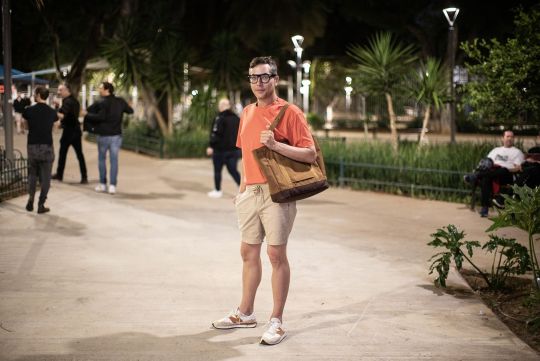
[ Tal Kallai is one of Israel’s most well-known drag queens, Talula Bonet. He is surprised that there are Western queer activists who support Hamas: “You are supporting a movement that the first thing it will do is kill you because you’re queer — you’re so stupid.” ]
At first, drag was just a hobby for him — one he continued to develop after moving to Tel Aviv to study at the Nissan Nativ Acting Studio. Then he was scouted by a local producer to do professional performances in the city, so he and three other drag queens from Jerusalem created a troupe called the Holy Wigs.
In the beginning, the Holy Wigs saw themselves as more intelligent and cultured than their competitors in Tel Aviv. “We weren’t doing like folk songs and stuff. We were doing musicals and theatre. We were very snobbish. We thought all the drag in Israel is so low-level,” said Kallai. Their ambition was encouraged by “drag mothers” (industry mentors), who taught them how to produce more theatrical performances.
As a professionally trained actor, Kallai wanted to move drag from the bars into the theatres. So that’s what the Holy Wigs did. Soon fans brought their parents and heterosexual friends, who were more comfortable seeing drag in a “respectable” cultural setting. Things snowballed from there.
With their popularity skyrocketing, the Holy Wigs hired a director and costume designer and went on tour. “We did all the history of Israel in drag, and it was very funny,” said Kallai. There were over 100 costume changes during the show, which they performed more than 350 times around Israel, predominantly in larger venues and theatres.
Throughout, Kallai continued his regular drag performances in Tel Aviv’s gay bars, including a weekly open stage event for new drag artists. He hosted this event for 11 years, helping countless performers establish themselves. “Now there is a very big drag culture in Tel Aviv, Jerusalem and in Israel,” said Kallai. “It’s 50 shades of drag.”
He recalled that during the early 2000s, gay Palestinians in Jerusalem had “their own community and their own parties — because they were very under the radar and not legally there.” The scene was “very big,” but hidden, with the use of “secret places with secret codes.”
There were even two Palestinian drag queens in the city during that period. One was an Israeli-Arab, married with six children. “He snuck around them and did the shows without his wife knowing,” said Kallai. The other queen was an illegal migrant from Gaza who eventually received asylum in Sweden. Kallai was glad that the Gazan queen found a safe home, even if she had stolen one of his wigs. “If this is the price I had to pay for her freedom, I’m happy,” he said.
I’m not trying to run from reality. I’m trying to deal with the reality and this trauma that we all had here.
-- Tal Kallai, aka Talula Bonet
Drag culture may be popular in Israel, but there has always been opposition to it. Kallai recalled seeing “lots of bad responses” when he performed at Jerusalem’s first Pride parade in 2002. The following years were not much better for Jerusalem Pride. In 2005, an ultra-Orthodox Israeli, Yishai Schlissel, stabbed three participants with a kitchen knife. Kallai said that another protester attempted to stab one of his friends, either the year before or after. “He passed me with the knife and went to her, but the police arrested him.”
Today, at Pride events, domestic opposition has been replaced with international scorn from anti-Israeli activists. As an ambassador of Israeli culture, Kallai has performed all over the world, sometimes with the spon.sorship of the Israeli government. In the early 2010s, a man spit on Kallai’s face at Berlin Pride after learning he was Israeli. Around that same time, at London Pride, pro-Palestinian protesters amassed in the audience of one of his shows, shouting and waving flags. He said that many famous drag queens are afraid to perform in Israel because of the potential backlash. For the ones who do come, “you can’t see any of it on their social media.”
For many years it was “very trendy” to be anti-Israeli within the LGBTQ community, but he was surprised when, after Oct. 7, Western queer activists supported Hamas. “You are supporting a movement that the first thing it will do is kill you because you’re queer — you’re so stupid.”
He used to spend considerable time on social media explaining the Israeli-Palestinian conflict to anyone who would listen. He even made a viral Instagram video, where he and another drag queen, in full costume, deconstructed the contradictions of “Queers for Palestine” social influencers. But it was like “talking with deaf persons,” he said.
After getting ignorant comments from internationally famous drag queens, he decided to stop caring about what the global drag community thinks. He gave up explaining.
When the theatres reopened after Oct. 7, Kallai debated whether it was appropriate to start performing again. He decided Israelis wanted to be cheered up, so he returned to the stage. But he emphasized that what he does is not “escapism.”
“Many people are using this word, you know, escapism, escapism. Like, I’m drinking beer with my friend — it’s escapism. I’m walking on the beach — escapism. No, I’m not trying to run from reality. I’m trying to deal with the reality and this trauma that we all had here,” he said.
He once advocated for Palestinian rights, but Oct. 7 changed everything. He was struck by how the residents of the kibbutzim around the Gaza Strip were gleefully murdered, even though they were “peace fighters,” who helped sick Palestinians find medical treatment in Israel.
“In the past, I was a person who believed with all his heart that there is a partner for peace. Now, I’m not sure,” Kallai said.
==
Do you think there's an LGBTQ swimming pool in Gaza?
🤔
#Adam Zivo#Israel#LGBTQ#Queers for Palestine#palestine#pro palestine#pro hamas#hamas supporters#hamas terrorism#islamic terrorism#terrorism supporters#religion is a mental illness
4 notes
·
View notes
Text
With the verve and bite of My Year of Rest and Relaxation and the whip-smart, wisecracking sensibility of a golden-age Hollywood heroine, Marlowe Granados’s stunning début brilliantly captures a summer of striving in New York City. Refreshing and wry in equal measure, Happy Hour is an intoxicating novel of youth well spent. Isa Epley is all of twenty-one years old, and already wise enough to understand that the purpose of life is the pursuit of pleasure. After a sojourn across the pond, she arrives in New York City for a summer of adventure with her best friend, one newly blond Gala Novak. They have little money, but that’s hardly going to stop them from having a good time. In her diary, Isa describes a sweltering summer in the glittering city. By day, the girls sell clothes in a market stall, pinching pennies for their Bed-Stuy sublet and bodega lunches. By night, they weave from Brooklyn to the Upper East Side to the Hamptons among a rotating cast of celebrities, artists, Internet entrepreneurs, stuffy intellectuals, and bad-mannered grifters. Money runs ever tighter and the strain tests their friendship as they try to convert their social capital into something more lasting than their precarious gigs as au pairs, nightclub hostesses, paid audience members, and aspiring foot fetish models. Through it all, Isa’s bold, beguiling voice captures the precise thrill of cultivating a life of glamour and intrigue as she juggles paying her dues with skipping out on the bill. Happy Hour announces a dazzling new talent in Marlowe Granados, whose exquisite wit recalls Anita Loos’s 1925 classic, Gentlemen Prefer Blondes, updated to evoke a recent, golden period of hope and transformation—the summer of 2013. A cri de cœur for party girls and anyone who has ever felt entitled to an adventure of their own, Happy Hour is an effervescent tonic for the ails of contemporary life.



#book: happy hour#author: marlowe granados#genre: contemporary#genre: literary#genre: coming of age#bookblr
3 notes
·
View notes
Text

Sublet
dir. Eytan Fox, 2020
© CINEMA BRAVO
3 notes
·
View notes
Text
lol remember in 2020 when i was looking for a room to rent and got in contact with a girl who was subletting her room, and she told me that there were 2 girls and 2 guys living there (counting her). but then when it came to actually signing paperwork i found out that the other girl was actually a trans woman bc he hadn't legally changed his name and his male name was still on the lease. now personally i didn't have a problem with living with 3 guys, and the trans woman ended up moving out pretty quickly and being replaced by some other guy anyway, but still. i feel like it was just dishonest and weird.
1 note
·
View note
Text
oh god okay firstly i hope i'm not derailing your post op feel free to tell me to shove off if so...
but lie, i was thinking about this the other day, and how it seems like so many people are calling out 'plot holes' or 'things that don't make sense' in non-2020s television- and primarily what's really got my goat is people saying that 'friends' is unrealistic coz the characters live in such large apartments.
and this is such a modern complaint! if you said that to someone during the 90s when it was airing, the other person would have rolled their eyes at you and reminded you that it was set on a sound stage in front of a live studio audience so where else are they gonna put the cameras?
we knew it was a tv show and it was on a fake set and we suspended our disbelief and just accepted it when monica said she was on the lease as subletting from her now deceased grandma. did it really make sense? probably not, but it's a tv show. on a set. on a stage. that needed to have room for cameras.
so yes i 1000000% agree with you op, we need to bring back suspension of disbelief and audiences also need to chill tf out when watching tv and movies, accept that they're fake and not real life, and move on
please i love you i'm begging you bring back suspension of disbelief bring back trusting the audience like. i cannot handle any more dialogue that sounds like a legal document. "hello, i am here to talk to you about the incident from a few minutes ago, because i feel you might be unwell, and i am invested in your personal wellbeing." "thank you, i am unwell because the incident was hurtful to me due to my childhood, which was bad." I CANT!!!!
do you know how many people are mad that authors use "growled" as a word for "said"? it's just poetics! they do not literally mean "growled," it's just a common replacement for "said with force but in a low tone." it's normal! do you hear me!! help me i love you please let me out of here!!!
78K notes
·
View notes
Text
Alright. The running goal is to maximize happiness and security for yourself.
The only things preventing you from leaving are housing and your feelings for Erin.
HOUSING
You need to come up with a magic number for money out of pocket to move into a place, and then achieve that sum of money in the time you have still living in 706, then hold there fast and hard. There are other options, like sublets and roommate finders if you don't hit that number, but the goal here is long-term security, stability, and independence.
ERIN
There is, obviously, still more than a spark there in my heart for her. Hate only really comes when you love something too. It is terrifying to imagine what a path through this looks like that ends with us both together and happy, and it's going to likely involve a lot of uncomfortable shit you'll have to eat. Hate and malice are easier, we learned that before.
Okay. As far as your actions go, the moves from here remain the same.
1. Keep Erin believing you're dedicated to saving the relationship. It would be nice if you could, I guess, but the MATERIAL (get me you wannabe Marxist?) upshot is free housing. The longer you can go without getting kicked out, the more money you have to get a new place, and then build and be free.
2. Money and housing. Save your FUCKING ass off. This is emergency mode rn dude. Stop hitting bars. Stop ordering fancy delivery. Limit Christmas gifts. You're gonna be okay, I'm sure, but you don't get to pretend life is all gravy right now. It's not. You are living (squatting) in your girlfriend's parents place for free. Wonderful yes, shameful too. Do the math and figure out what you need to hit that fucking number for housing, then achieve it. Mom has offered to be a resource. Five grand makes or breaks you rn, sadly. But, as you stand RIGHT NOW at 1:11am on 12/19/24, before two paydays hit before the end of the year and with one containing a Christmas bonus coming on the 2nd, you have access to:
Okay well one check just hit but rn, before asking mom for shit, you have 8.5k on hand to play with if you cash adv your cc. You have almost a grand in cash in your overstuffed wallet, more to come I'm sure, you can get 5k from mom as a loan, you have a job so you'll get more paychecks. Conceivably, you can have $15k accessible by the end of the year, for a nightmare move-in before Erin returns.
Yeah, that's a much better situation than 2020.
Fuck.
0 notes
Text
Friendship Realness!
Ambiance: People For Your Life by Isaiah Templeton
Written circa January 2022
We often equate the provision of God to unexpected monetary increase. We quote scriptures like Malachi 3:10 or Ephesians 3:20 back to God, reminding Him of His biblical promises to us regarding our finances. For me during the pandemic, especially the end of 2020 into the beginning of this year, I understood the provision of God toward me as being able to stay in New York City and afford my lifestyle. Not that I live like a Rockstar or anything, but being a performer, income has been touch and go. As I zoom out and really take inventory of my current circumstances, I realize that the sanity that I’ve been able to maintain hasn’t all been from a warm bed and a warm meal. (Though, for that, I am EXTREMELY GRATEFUL!) It’s mostly come from the people that God provided me with last year to isolate me even as He pieced the monetary provision together on my behalf. God has kept a roof over my head and food in my belly but even when it may have seemed like I was cutting it close financially, I’ve had community girding me up every step of the way.
When the pandemic first began last March, I was still in graduate school and teaching private voice lessons at New York University. There was very little time to process what was going on in the world while moving out of graduate housing, transitioning myself and all my students to virtual schooling and preparing for my final recital (which now had to be in the living room of my new Brooklyn digs). By the time I really wrapped my mind around what was happening outside of my small bubble, it was probably mid-May, early-June. It was then that I was able to process what this really meant for those in the arts, as the steady checks from my assistantship came to an end. I had a mini meltdown. The world as I knew it was completely different and I was grieving all those end-of-the-year victory celebrations as our normal graduation plans were and are still currently tabled indefinitely. It was weird and confusing, but I wasn’t alone. None of us are.
Between the months of April and July, God provided. He provided me with people, community, accountability and fellowship. Even moving into a new apartment was through a colleague who I went to graduate school with that had some roommates move out “unexpectantly” the month before and, of course, the perspective sublet just “never showed up”. God is intentional and specific in my needs and interests were taken into consideration and accommodated. The fitness accountability group that He connected with last May was my saving grace for consistently through all the swift transitions. The bible study that He connected me with last June is a group of Opera singers that are believers. The Elevation Church eFam eGroup that I’m apart of is a group of women that is committed to allowing God into our holistic health, falling right in line with the weight loss journey that I’m on. Miraculous how God saw me, heard my cries and led me to people with whom I could be all of myself.
We are all going through this radical redefining of reality together and yet there is still such nuance to everybody’s circumstances. The provision of God spans all aspects of our lives, including the luxury of having someone to call when times are tough who doesn’t diminish the reality of our pain while still helping us find gratitude. It’s knowing that God’s hand is in the loving call from my grandmother right when I needed it or being able to talk about the fear in the performing arts world with my Bible study sisters. Provision ranges from never being short on a bill to never lacking in community to reach out to when things get tough mentally and emotionally. I thank God for being surrounded by people I can trust with the hard times and rejoice with me when unemployment gets extended AGAIN and I get another private voice student on my roster. It’s all from the hand of God.
0 notes
Text
[ad_1] The Influence of the Pandemic on Hire: How Renters are Coping The COVID-19 pandemic has caused important adjustments to many features of our lives, together with the housing market. As companies closed and hundreds of thousands misplaced their jobs, many renters have struggled to make ends meet and pay their lease. This has led to a rising disaster for renters throughout the nation, with many going through the specter of eviction and homelessness. One of the fast impacts of the pandemic on lease has been the lack of revenue for a lot of renters. As companies shut down and other people misplaced their jobs, the power to pay lease turned a serious concern. Based on a survey carried out by Condominium Record, 32% of renters reported that they have been unable to pay their lease in full for at the least one of many months between April and July 2020. This has left many renters struggling to make ends meet and has led to mounting lease arrears. In response to the monetary pressure brought on by the pandemic, many renters have turned to their landlords for help. Some have been profitable in negotiating lease reductions, deferrals, or fee plans with their landlords. Others have been in a position to entry monetary help by way of authorities packages, resembling rental help funds or eviction moratoriums. Nonetheless, these measures haven't been universally efficient, and plenty of renters proceed to face monetary hardship and the specter of eviction. To deal with the influence of the pandemic on lease, some renters have needed to make important changes to their dwelling conditions. Many have needed to downsize to cheaper housing choices, transfer in with household or buddies, and even develop into homeless. These adjustments have had a profound influence on the psychological and emotional wellbeing of renters, as they grapple with the uncertainty and instability of their housing scenario. Regardless of the challenges they face, some renters have discovered methods to adapt and cope within the face of the pandemic. Some have taken on further work to make ends meet, whereas others have embraced frugal dwelling and have reduce on bills. Some have even turned to inventive options, resembling subletting their residences or turning to short-term leases to generate further revenue. Because the pandemic continues to unfold, it's clear that the influence on lease can be felt for a while. Renters will proceed to face monetary hardship and the specter of eviction, even because the financial system begins to recuperate. It's essential for policymakers, landlords, and neighborhood organizations to return collectively to offer help and help to renters in want. This will embrace extending eviction moratoriums, offering monetary help, and creating reasonably priced housing choices for these in want. In conclusion, the pandemic has had a major influence on lease, leaving many renters struggling to make ends meet. Whereas some have been in a position to adapt and deal with the challenges, many proceed to face monetary hardship and the specter of eviction. It's important for all stakeholders to return collectively to offer help and help to renters in want throughout this difficult time. [ad_2]
0 notes
Text
Bedstuy
I think my favorite area in Brooklyn will always be Bedstuy. When I first moved back to Brooklyn, I moved to Bushwick. I found a room online, because I only lasted about 2 weeks living with my parents. In this new apartment, I-didn’t have a bed yet, 3 roommates lived with me, and there was no AC, right in the beginning of June. When I moved to Brooklyn from LA, I was lucky enough to have a savings but I was a month late in getting a job. Where all the good hospitality jobs in the summer are all hired by June 1st.
It was difficult but I was happy to have my dog back, finally a twin bed from amazon, and an opening to a hotel serving job. I tried a bunch of different serving jobs, they weren’t quite paying the bills, so I had to drop one by one until I found consistency. Also the sublet I had was totally falling apart, and when the roommates asked me to extend, I declined, I was hustling hard for something better, with a lot of rejections. My old friend sent me a text while I was on the subway “are you still looking for a room”. I texted back right away “yes!”.
I saw the place, and there was beef between the previous roommates, whom I never met. My room was small, and the closet was very tiny, but I liked the patio area and having the ability to sit outside. I loved the exposed brick, that there were 2 bathrooms, hardwood floors, and central air after dying without AC. I asked where we were located and my friend said “Bushwick”, she told me the price of the room was $750, and I took it.
It was 2 weeks later that I found we lived in Bedstuy. My other friend moved down the block, just a street away. I said we lived in Bushwick, and she corrected me that we were in Bedstuy, I kept saying no it’s Bushwick. She goes - Do you wana live in Bushwick? I didn’t care where it was. I was just told something different. We totally were living in Bedstuy. It was 2019. I first was working at a hotel called Sister City, that came from the Ace Hotel Group. The money wasn’t really good and had to quit, and became an Assistant Front Office Manager at a hotel down the block in Nolita. That kind of job pays okay, but not enough, so I ended up getting a job at the Biergarten at the Standard Hotel as well. Where I finally felt like I was making enough money.
The years I spent in Bedstuy got blurry because 2020 had occurred and we all lost our jobs for about 6 months. Thankfully I received unemployment. Spent days hanging with friends, biking to the beach, and taking care of my family. Everyone got sick which was traumatizing, as well as I was going through a breakup, and falling in love all over again. I got close with my roommates and my friend who lived a block away because we weren’t able to talk to anybody else.
I had thin walls where even though I wanted to spend time a lone, I felt like I was in conversation with my roommates in the living room. Only a 15 min bike ride away from Williamsburg and I was a server on the roof of a hotel in Williamsburg. I did a virtual play as well as host my events in Brooklyn.
Blogging began again here. I painted my room Blue with a landscape of Buenos Aires, my dream city I’ve never been to. My wall fell down in January of 2021 which was totally scary. Because even though this was a modern apartment, it was decaying on the inside. My dog got sick, the signs was that he completely stopped eating, and then he died of old age while I was living there.
I grew from the age of 28 to 31 in that apartment. I traveled a lot. Started with little trips like Boston, Upstate, Long Beach Island, then to Dominican Republic, California a few times, Mexico, Belize, Miami, Las Vegas, Nashville, Seattle. The winters were bad in New York, where depression would hit. I also learned a lot about boundaries, and not feeling the need to people please finally, and learning to keep my circle small. When I had money I would treat my nephews with lavish gifts including hotel rooms in New York, a bouncey house, and a piano keyboard.
I worked in Manhattan and it was a nice medium. I met a boy in Jersey City. We kept separate apartments him in JC and me in Bedstuy, until the rent went up $400 per room a month. So I moved to Jersey City. I had to do my last things to do in Bedstuy; chill in Herbert Von King Park and eat tacos at Warude. Get a drink at Chilos or the rolling creamery near the house. I made a lot and would spend a lot. My rent was a bit more living a lone and I was still in a somewhat a fast life.
I dated two guys in that apartment, and went through 4 jobs, different projects. It was sustainable. I learned standards with that apartment and will always have a deep love for Brooklyn and living here. Bedstuy doesn’t feel pretentious and some interesting things like a bird and Laundry machine store. Cages of birds to sell and laundry machines. It’s not really cheap but not as expensive as Manhattan. There’s amazing arepa truck on Broadway, a 24 hour juice spot, filipino breakfast with Ube lattes, an astrology bar. It gets weird and fun and I’ll always be into a chill vibe now that New York is home. I remember leaving and a tattoo shop just opened next door. It’s a feeling in this part of town and there will always be a big part of me who feels she grew up in Bedstuy. Because I had to start over, had to heal, and had to grow. Thankfully I did it all there.
0 notes
Text
FASHION & SHELTER
Before you can speak, you must hide your nakedness.
In 2023, rent and house prices reached an all-time high while earnings, for the most part, remained stagnant. As houses have been amalgamated from commodities to investment opportunities,
young people worldwide have entered a state of chaos -
the housing crisis.
In recent times, we have become acquainted with many- a-crisis yet
the housing crisis has always struck me as the most painful, the most wincing.
A grievance, I have personally understood, having previously made a house out of other’s beds, couches, sublets, train stations and floors.
There is no big mystery as to why many people do not have homes, housing is not a human right
and the people who could help - aren’t helping.
Aside, the concept of the home is changing.
The would being increasingly digital, - our sense of self has become fragmented across physical and online spaces, tour physical environment does not dictate much about our identity,
now more than ever.
Many have found abstracted forms of security online,
seeking refuge in digital personas.
Groups that were once pushed to the fringes of society, now blossom with hives of users worldwide providing a sense of community that often cannot be found locally. Newer parts of mainstream culture show this trend - veganism, incels, anime, alternative medicine, and meme culture are all at the forefronts of Internet culture - simultaneously occupying and competing with a million other societies.
Most would agree that a home needs a sense of belonging, safety, and security.
Shelter must affirm our sense of belonging and hide us from danger.
In this context, young people can find these senses within the digital world and aim to replicate the experience in real life.
The physical becomes the temporary present,
the digital becomes the aspirational future.
In this context, fashion’s penetration into the post-Internet psyche has taken on a new significance,
as it not only serves as a means of self-expression but also as a way to connect our physical and digital worlds. Through its visual nature, fashion has become a way to curate and self-promote our idealised online personas,
allowing us to create a somewhat cohesive and consistent image across both our physical and digital worlds.
By embracing fashion as a means of connection, we could further bridge the gap between both planes of existence, and create a more integrated sense of identity in the digital age.
Fashion, as it stands, in the current day is heavily centred on persona, identity and image than ever before.
Brands no longer compete in the space of billboards and magazines but in between photos of your friend’s latest dog update and videos of your brother’s wedding.
In the online arena, brands use these to communicate to buyers and potentials that if they were a person, this is where they would spend their free time, this is what they eat, these are their friends and they’re as real as you and I.
Balenciaga is an edgy friend from Berlin, and Gucci is a cousin that just discovered cottagecore.
Is this nefarious or just an evolution of how we already associate brands?
On that point, young people who grew up with the Internet have used fashion to develop different personalities and interests, fashion becomes an entry point for subcultures to be entered and returned to with little to no friction.
You’re excused for buying the Off-White safety belt in 2014, a skateboard in 2016, or the dress -that-must-not-be-named in 2020.
You weren’t entirely a victim of marketing, you were probably just bored.
You don’t necessarily need to drive to the furthest thrift store in your town and ask for old flannels and mud-stained jeans anymore. You can buy them on Amazon
and be grunge for a day.
And tomorrow, you can dress like Paris Hilton.
The average person is buying 60 per cent more clothing than 15 years ago, while each item is kept for only half as long.
All this spending on clothes…
Do appearances really matter that much?
Within seconds of meeting a person, the brain already picks apart their body, body language, their mouth, speech, their eyes, and eye contact.
A study by Janine Willis and Alexander Todorov, titled "First Impressions: Making Up Your Mind After a 100-Ms Exposure to a Face"
found that people make judgments about someone's personality based on their physical appearance within just 100 milliseconds of seeing their face.
The researchers found that people are more likely to perceive someone as
trustworthy, competent, and likeable if they have an attractive appearance.
Another study by Hajo Adam and Adam D. Galinsky found that people consistently judge others based on their clothing choices.
The researchers found that people make assumptions about someone's personality, social status, and even their job based on the clothing they wear.
The study also demonstrated how wearing different types of clothing can affect a person's behaviour, confidence, and performance on tasks, concluding that clothing can have a symbolic meaning, affecting a person's psychological state and cognition.
Then we say, appearance matters.
And does our fashion affirm our identities or hide our true selves?
Does the soldier who wears his army uniform to Walmart wear the uniform to affirm his identity as a symbol of service or to hide his disconnection from civilian life?
Likewise, does a sorority sister dress like her friends to affirm that she belongs in her community
or to hide her personality?
Similarly, shelter operates to hide the true self from the outside world.
Even in The Fall of Man, after Adam and Eve eat the forbidden fruit,
they become aware of their nakedness and feel shame. In an attempt to conceal their bodies, they hid from God, hastily fashioning cloths from fig leaves.
Then they were banished, to leave their idyllic home of the Garden of Eden for the wilderness.
In this way, fashion works like shelter, to affirm and to hide.
At home, you can hide. At home, you can be yourself.
I had these thoughts over the course of 13 days as I entered a whirlwind cacophony adventure to rent a room in the East End. The landlord, ‘a true geezer’ named Boris, no, Dave, no, Dan,
a 65-year-old toddling man Cayman Islands resident with 100 names that led to no end.
The house was a beautiful yet dilapidating Victorian build. A real charmer, yet a husk of what was once probably very beautiful, now clad with peeling wallpaper, cobwebs, and about a thousand health and safety violations.
Boris, Dave, or Dan (whatever his name was) summoned my newfound Spareroom pen pals and me with No Caller ID, then insisted we pay a deposit upon entry. His wife in a long hooded puffer jacket sat in the corner chewing her fingernails, swearing that despite the heating not working, us not coughing up a deposit would be a terrible thing for us.
After demanding heating, we were ghosted and left back on the property search hoopla, which had already been 4 months of web-surfing, bidding wars, and cosying up with the sleaziest real estate agents you could imagine.
I eventually found my place, pulling up to the viewing with all my belongings in bags -
demanding that the room was mine, and not leaving until every paper was signed.
In the weeks leading up to this article being written, I met Kieran* near Whitechapel Station.
Kieran had been living without a home for nearly 6 months.
I told him about my essay and he told me how his clothes had played a crucial role in his daily life.
Wearing multiple layers meant storage and staying warm during cold nights.
A hoodie or a beanie, could help him blend in with the crowd and avoid being harassed by police.
The clothes he got from local shelters and community organisations, had let him go to some job interviews without a worry.
He said that when he was first homeless, he felt like he had lost himself.
He just got a favourite jacket and he wore it almost every day, which made him feel more confident and more like himself.
Without a house, clothing is not just a matter of practicality but also a source of
comfort and self-expression.
Ultimately, fashion in the present day is more than a tool. It is an important aspect of our identity, our self-worth and our feeling of belonging within a world that can sometimes feel ever so outside of our reach.
Ultimately, our understanding of this will allow us to fulfil deeper connections with our objects as we, consciously or not, already place a high level of significance on their relation with our lives.
I close this essay to thank everyone that gave me shelter.
Every girlfriend’s room,
every friend’s failed sublet,
every train operator,
every couch,
every floor,
every shed,
every floor.
I am grateful now to have a place I can call my own.
Thank you.
Editor’s Note
According to The Tower Hamlets Council, Kieran* is now living in a council estate in Stepney Green.
His name has been changed in this article to respect his privacy and his account has been given with written consent.
For the remainder of the year, I have decided to support Crisis UK, a non-profit organisation that provides housing and support for people experiencing homelessness. To show my commitment, I will be donating 10% of my salary to the organisation.
I strongly believe everyone deserves a place to call home. While donating money is not the only way to help, I hope that my donation can make a positive impact on someone's life. I encourage others to join me in supporting organisations like Crisis UK, as together we can work towards ending homelessness and building a better future for all.
1 Homelet. (2023). Homelet Rental Index. [online] Available at: https://homelet.co.uk/homelet-rental-index
2 Petrosyan, A. (2023). Digital population. Available: https://www.statista.com/statistics/617136/ digital-population-worldwide/
3 Remy, N., Speelman, E., & Swartz, S. (2016, October 20). Style that’s sustainable: A new fast-fashion formula. McKinsey & Company. https://www.mckinsey.com/capabilities/sustainability/our-insights/style-thats-sustainable-a-new-fast-fashion-formula
1 note
·
View note